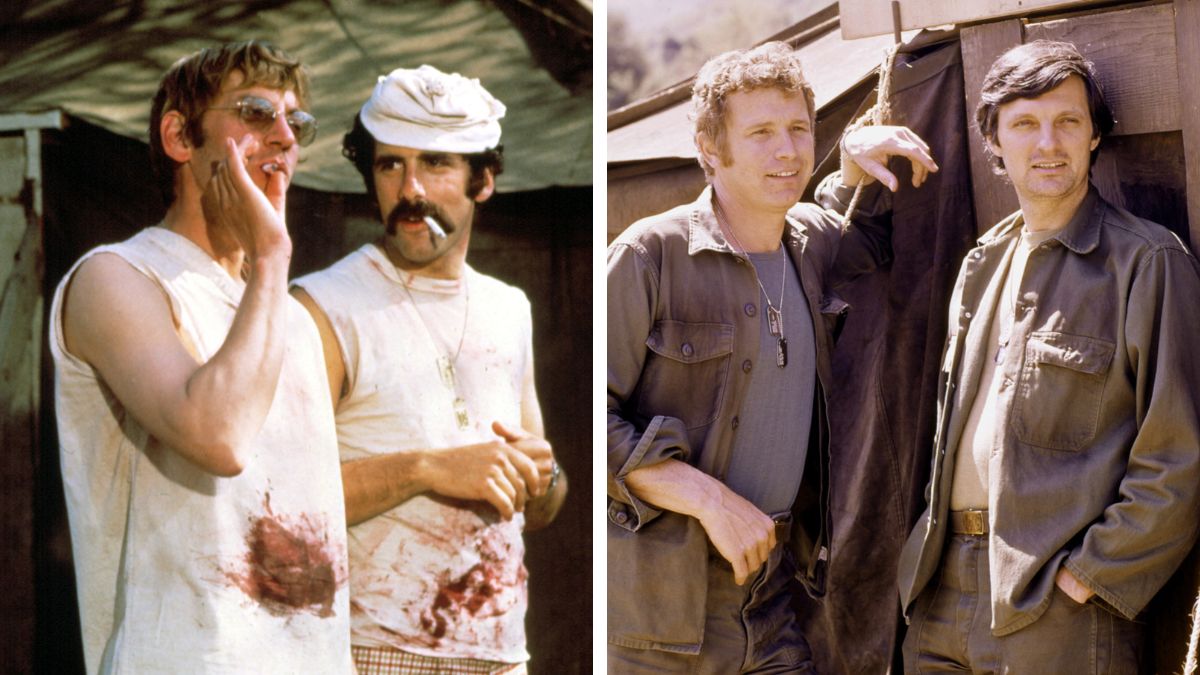
The Legacy of MAS*H: From Film to Television
The classic comedy MAS*H had one of the most impressive runs of any TV series. The show, which starred Alan Alda and Wayne Rogers as Hawkeye Pierce and Trapper John, two surgeons stationed at the 4077th Mobile Army Surgical Hospital during the Korean War, debuted in 1972 and ran for 11 years, airing 256 episodes before its 1983 finale, which remains the most-watched final TV episode of all time.
During its decade-plus on CBS, MAS*H had such a popular following that some viewers may have come to the show not realizing it was an adaptation. In fact, the series was based on the 1970 film of the same name, which had in turn been adapted from the 1968 novel MASH: A Novel About Three Army Doctors by Richard Hooker.
The cinematic adaptation of MASH, directed by Robert Altman and starring Donald Sutherland and Elliott Gould as Hawkeye Pierce and Trapper John, earned rave reviews and was one of the biggest box office successes of the year. While it was a period piece, it perfectly captured the zeitgeist during the Vietnam War, and given its success, it's not necessarily surprising that it was spun into a TV adaptation. What is surprising is Altman's reaction to the show. Keep reading to find out what the director of the original MASH thought of the TV adaptation—and what the sole actor to appear in both had to say about it.
Robert Altman’s Disappointment with the TV Adaptation
To put it mildly, Robert Altman was not a fan of the MAS*H TV show. In his director's commentary for the film, included on its DVD release, he called the show "the antithesis of what we were trying to do" and was dismissive of its cast, referring to Alan Alda as "Alan Albert, or whatever his name is." He also said that he found the show to be "quite a racist thing" and felt that it was unfaithful to his movie's original political message.
In the book Robert Altman: The Oral Biography, the director expressed his lasting resentment toward the show, saying, "The problem with so many artists today is if a guy succeeds at something in an art form, he feels he is obligated to repeat it. I can't tell you the amount of money I was offered to make another MAS*H or another picture like it, I wouldn't even mess around with that television series. I mean, I've never seen one of those episodes all the way through—never seen a whole one. I don't like it and I don't like any of those people. And it's jealousy, too, that drives me to have those opinions. It's ‘How dare they walk into my studio and look at my easel?'"
Gary Burghoff: The Only Actor in Both the Movie and the Show
While the main characters in the MAS*H TV show were in the movie, the cast was entirely different, with the exception of Gary Burghoff, who played company clerk Radar O'Reilly in both. Burghoff left the show following its seventh season in 1979, but he came back in the next season for a two-part farewell episode.
As the only actor to star in both the movie and the show, Burghoff had a unique perspective on MASH, and he changed his portrayal of Radar to fit the decidedly different tone of the show. As he described, "In the original feature film MASH, I created Radar as a lone, darker and somewhat sardonic character; kind of a shadowy figure. I continued these qualities for a short time until I realized that the TV MAS*H characters were developing in a different direction from the film characters. It became a group of sophisticated, highly educated doctors (and one head nurse) who would rather be anywhere else and who understood the nature of the ‘hell hole' they were stuck in . . . I began to mold Radar into a more innocent, naive character as contrast to the other characters, so that while the others might deplore the immorality and shame of war (from an intellectual and judgmental viewpoint), Radar could just REACT from a position of total innocence."
Clearly, the MAS*H movie and TV show were very different, and while the lone actor from both seemed to maintain an appreciation for the show's differences, Robert Altman certainly didn't.
The Evolution of MAS*H
The success of the original MAS*H film led to a television series that took on a life of its own. While the film was known for its dark humor and anti-war sentiment, the TV show leaned more into the comedic aspects of the setting, focusing on the camaraderie and absurdities of military life. This shift in tone and style was a major point of contention for Altman, who felt that the TV version strayed too far from the original vision.
Despite this, the TV series went on to become a cultural phenomenon, influencing countless other shows and leaving a lasting legacy. Its blend of humor and heart, along with its memorable characters, made it a standout in the world of television. The show's ability to balance comedy with serious themes helped it resonate with audiences for years to come.
Conclusion
MASH remains a significant part of television history, not only for its long run and high ratings but also for its impact on popular culture. While the original film and its TV adaptation differed in many ways, both left a mark on the entertainment industry. The story of MASH is one of evolution, adaptation, and enduring popularity, proving that even when creative differences arise, the right combination of talent and storytelling can create something truly special.

Post a Comment